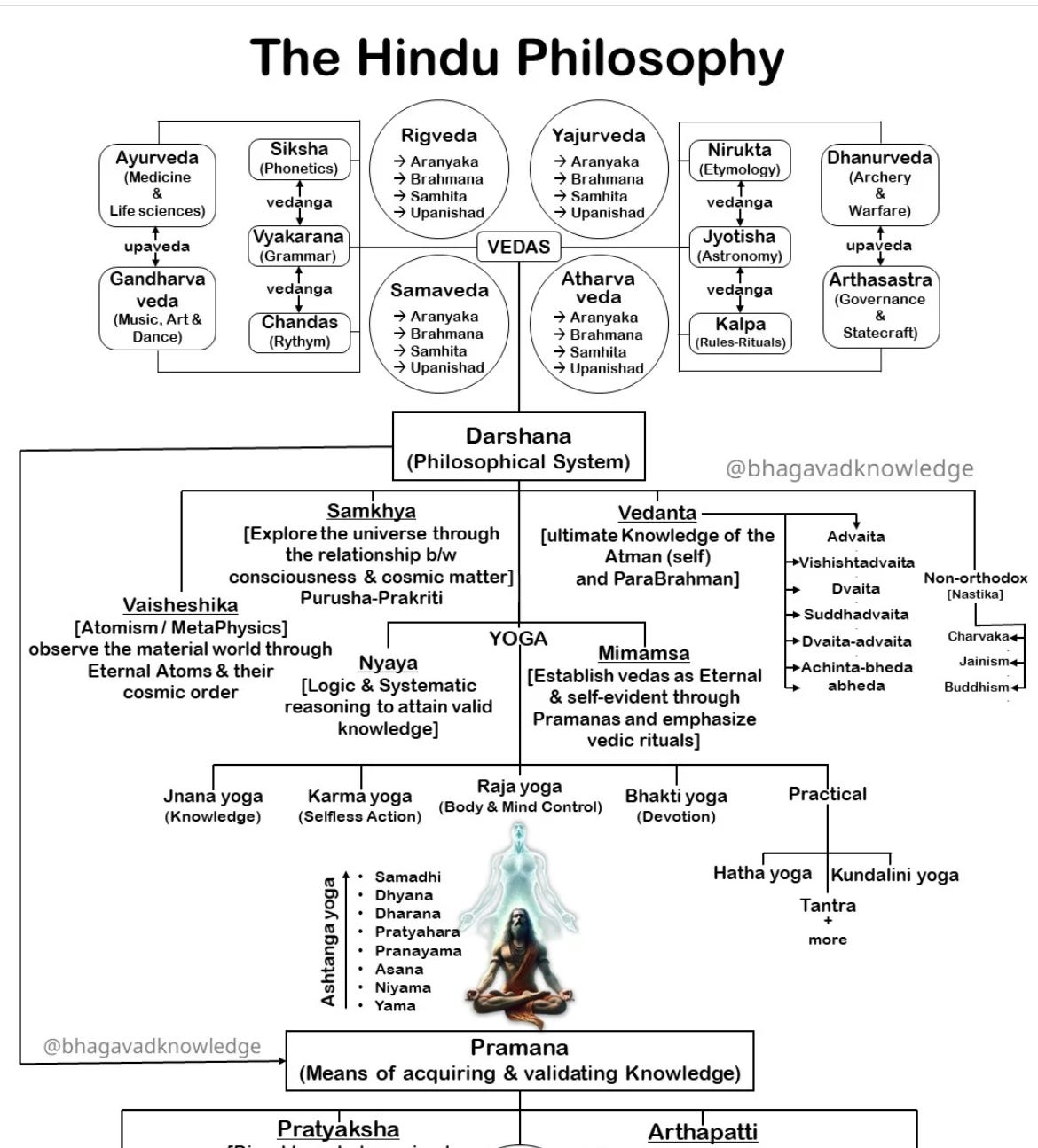Hindu philosophy is an extensive and profound system of thought that encompasses multiple aspects of life, knowledge, and spiritual growth. It is deeply rooted in the ancient scriptures of India, particularly the Vedas, which form the foundation of all Hindu knowledge systems. The structure of Hindu philosophy can be classified into different branches, including Vedic literature, philosophical schools (Darshanas), and means of acquiring knowledge (Pramana).
Vedas – The Foundation of Hindu Knowledge
The Vedas are the oldest and most authoritative scriptures in Hinduism. They are divided into four primary texts:
Rigveda → Contains hymns and praises to various deities.
Yajurveda → Focuses on rituals and sacrifices.
Samaveda → Concerned with musical chanting and melody.
Atharvaveda → Includes knowledge about daily life, health, and rituals.
Each Veda is further divided into four components:
Aranyaka (Forest texts)
Brahmana (Ritual texts)
Samhita (Hymns and prayers)
Upanishad (Philosophical teachings)
Other Essential Vedic Disciplines
The Vedas also include auxiliary sciences and disciplines such as:
Ayurveda (Medicine & Life Sciences)
Siksha (Phonetics)
Vyakarana (Grammar)
Chandas (Rhythm)
Nirukta (Etymology)
Jyotisha (Astronomy)
Kalpa (Rules & Rituals)
Gandharva Veda (Music, Art & Dance)
Dhanurveda (Archery & Warfare)
Arthashastra (Governance & Statecraft)
Darshana – The Six Philosophical Schools
Hindu philosophy is classified into six orthodox systems (Darshanas), each offering unique perspectives on reality, the self, and the ultimate truth. These are:
Samkhya – Explores the universe through the relationship between Purusha (consciousness) and Prakriti (cosmic matter).
Vedanta – Focuses on ultimate knowledge of the Atman (self) and ParaBrahman (supreme reality). It has various sub-schools, including:
Advaita (Non-dualism)
Vishishtadvaita (Qualified non-dualism)
Dvaita (Dualism)
Suddhadvaita
Dvaita-advaita
Achinta-bheda-abheda
Vaisheshika – A school of atomism and metaphysics that explains the material world through eternal atoms and their cosmic order.
Nyaya – Focuses on logic and systematic reasoning to attain valid knowledge.
Mimamsa – Establishes Vedas as eternal and self-evident through Pramanas (valid means of knowledge), emphasizing Vedic rituals.
Yoga – Provides a disciplined path to achieve self-realization and union with the divine.
Yoga – The Path to Liberation
Yoga is an integral aspect of Hindu philosophy, offering different approaches for spiritual development:
Types of Yoga
Jnana Yoga (Knowledge)
Karma Yoga (Selfless Action)
Raja Yoga (Body & Mind Control)
Bhakti Yoga (Devotion)
Practical Yoga such as Hatha Yoga and Kundalini Yoga
Tantra and other esoteric practices
Ashtanga Yoga (Eightfold Path of Yoga)
Yama (Ethical restraints)
Niyama (Discipline)
Asana (Physical postures)
Pranayama (Breath control)
Pratyahara (Withdrawal of senses)
Dharana (Concentration)
Dhyana (Meditation)
Samadhi (Enlightenment or absorption)
Pramana – The Means of Acquiring Knowledge
To attain valid knowledge, Hindu philosophy recognizes different Pramanas (means of knowledge acquisition):
Pratyaksha – Direct knowledge gained through self-experience.
Anumana – Knowledge derived through logical reasoning.
Upamana – Gaining knowledge by comparing an unknown object with a known one.
Arthapatti – Knowledge gained through factual exploration.
Anupalabdhi – Knowing something through its absence.
Sabda – Knowledge acquired directly from authentic testimony (spoken/written words).
Non-Orthodox (Nastika) Schools
Apart from the six orthodox Darshanas, Hindu philosophy also acknowledges non-orthodox schools that challenge the authority of the Vedas:
Charvaka – A materialistic and atheistic school of thought that denies the existence of an afterlife.
Jainism – A religion emphasizing non-violence, self-discipline, and multiple perspectives (Anekantavada).
Buddhism – Founded by Gautama Buddha, it teaches the path to enlightenment through the Four Noble Truths and the Eightfold Path.
Hindu philosophy is vast and multifaceted, providing an all-encompassing approach to understanding reality, consciousness, and the self. From the Vedas to the six Darshanas and various means of knowledge acquisition, it offers a structured yet flexible path for spiritual and intellectual growth. Whether through yoga, logic, rituals, or devotion, Hindu philosophy caters to different minds and temperaments, allowing every individual to embark on their unique journey toward truth and liberation.
Understanding this intricate system not only provides insight into Hinduism but also offers profound wisdom that transcends religious and cultural boundaries, making it relevant for seekers of knowledge across the world.


